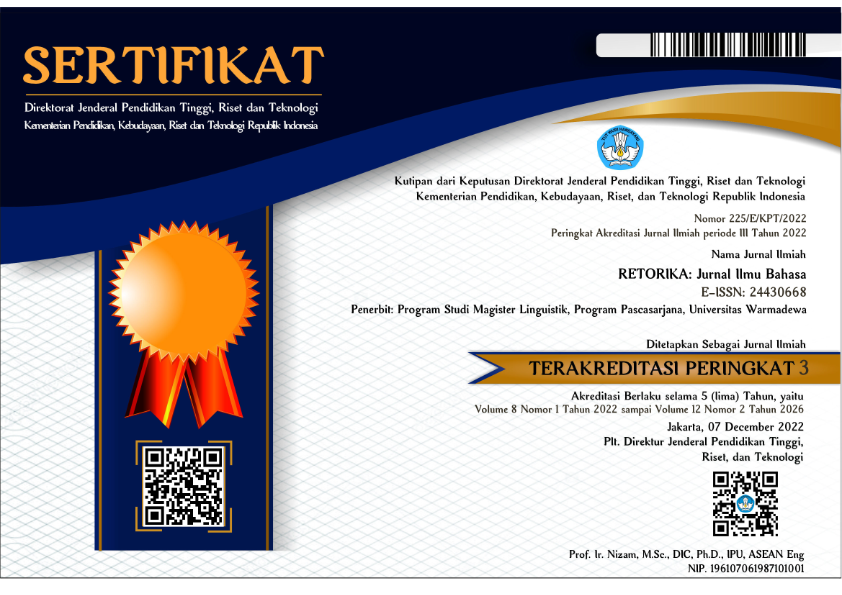POLITENESS OF VERBAL AND NON-VERBAL DIRECTIVE SPEECH ACTS IN THE TENTH GRADE STUDENTS’ LEARNING PROCESS OF NEGERI 1 MATARAM
Abstract
This research aims at knowing: (1) the realization of politeness of verbal and non-verbal directive speech acts of students, (2) deviations on politeness principles of students’ directive speech acts, and (3) the determining factors to the politeness and non-politeness of verbal and non-verbal directive speech acts for the Tenth Grade students of SMA Negeri 1 Mataram in the process of learning in the classroom. Research subjects in this study were the teachers who taught Indonesian, English, Economics, History, Mathematics, Religion, Civics, and Natural Sciences (IPA), and all students who are in class X of IPS 2, IPA 1 and IPA 3 in SMA Negeri 1 Mataram. This research belongs to qualitative descriptive study. The data were collected using observation method. The results of this study showed that: (1) there is the emergence of speech acts of the verbal and non-verbal directive of the students in the learning process, such as directive speech acts of rebuking, commanding, banning, advising, asking, reminding, satirizing, suggesting, threatening, rebuking, and (2) there is deviation of the principle of politeness of directive speech acts that is deviation of principle of one maxim, two maxim, and deviation of three maxim, and (3) there are influencing factors for the politeness and non-politeness of verbal and non-verbal directive speech acts of students in the learning process , including linguistic and non-linguistic factors.References
Brown, P. (2015). Politeness and Language. International Encyclopedia of the Social & Behavioral Sciences, 18, 326–330. https://doi.org/10.1016/B978-0-08-097086-8.53072-4
Hiani, K. El. (2015). Performing Speech Acts among Moroccan EFL Advanced Learners. Procedia - Social and Behavioral Sciences, 199, 479–485. https://doi.org/10.1016/j.sbspro.2015.07.535
Leech, G. (1983). Principles of Pragmatics. In New York (first edit). Pearson Education Limited.
Skewis, M. (2003). Mitigated directness in Honglou meng: Directive speech acts and politeness in eighteenth century Chinese. Journal of Pragmatics, 35(2), 161–189. https://doi.org/10.1016/S0378-2166(02)00084-X
Tesoriero, F. (2006). 31. Personal Growth Towards Intercultural Competence Through an International Field Education Programme. Australian Social Work, 59(2), 126–140. https://doi.org/10.1080/03124070600651853
Yaman, İ. (2015). Digital Divide within the Context of Language and Foreign Language Teaching. Procedia - Social and Behavioral Sciences, 176, 766–771. https://doi.org/10.1016/j.sbspro.2015.01.538
Zerkina, N., Lomakina, Y., & Kostina, N. (2015). Axiological Linguistics and Foreign Language Teaching. Procedia - Social and Behavioral Sciences, 199, 254–260. https://doi.org/10.1016/j.sbspro.2015.07.514
Copyright (c) 2018 RETORIKA: Jurnal Ilmu Bahasa

This work is licensed under a Creative Commons Attribution-ShareAlike 4.0 International License.
This journal provides immediate open access to its content on the principle that making research freely available to the public supports a greater global exchange of knowledge.
All articles published Open Access will be immediately and permanently free for everyone to read and download. We are continuously working with our author communities to select the best choice of license options, currently being defined for this journal as follows: Creative Commons-Non Ceomercial-Attribution-ShareAlike (CC BY-NC-SA)
 Abstract viewed = 365 times
Abstract viewed = 365 times
 PDF downloaded = 730 times
PDF downloaded = 730 times

2.png)














